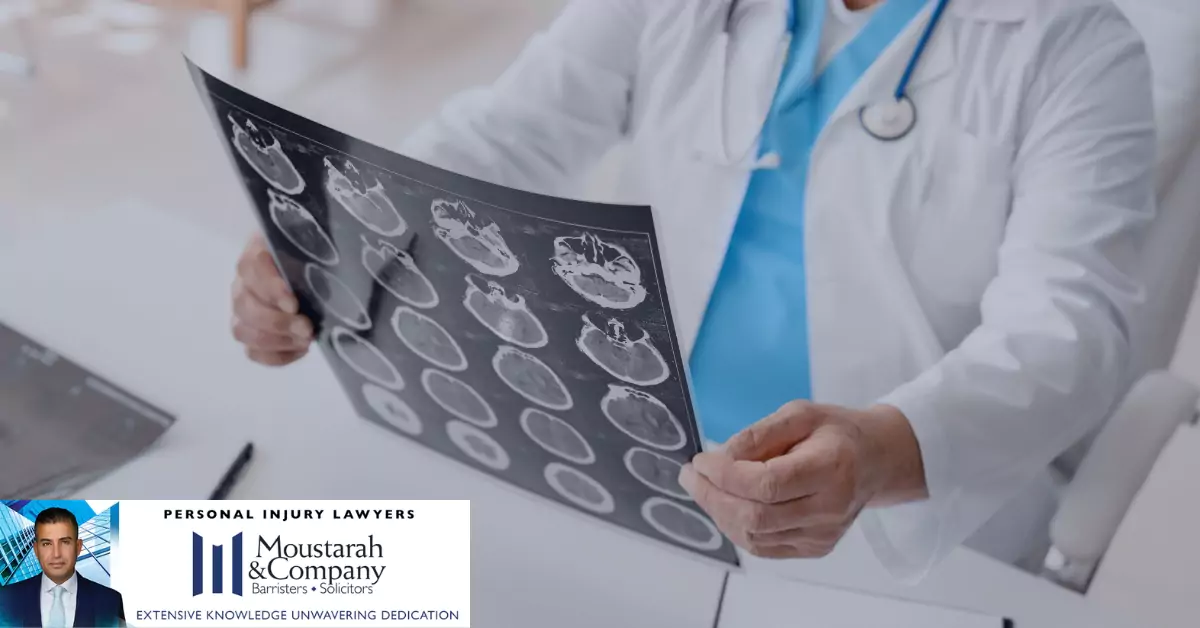Choose Moustarah & Company for your Traumatic Brain Injury case. We ensure fair justice and compensation.
You may be entitled to compensation if you have suffered a brain injury as a result of someone else’s negligence. Please consult our Personal Injury Lawyers in Edmonton to learn more about your options concerning pursuing a claim for your traumatic brain injury (TBI). A brain injury is often a lifelong chronic problem with potentially devastating effects. Traumatic brain injuries are usually classified on a scale including mild, moderate, or severe. A concussion is a mild traumatic brain injury (MTBI).
Brain injuries can be challenging to diagnose and may not manifest for some time after the accident. Brain injuries can cause changes in a person’s personality and affect their quality of life. You may need specialized care and support for your daily living. Brain injuries can significantly affect a person’s physical and emotional health. You may experience long-term health issues and may require extensive medical treatment during your recovery. A severe TBI will need referrals to medical experts like neurologists, psychiatrists, neuropsychologists, and neurosurgeons. You may also experience financial hardships as the injuries caused by an accident may render you unable to return to work or need workplace accommodations. If you or a loved one has suffered a brain injury, our injury lawyers can help you get compensation.
Because of the nature of brain injuries and the tendency for them to sometimes become more pronounced over time, you mustn’t sign any insurance company documents before consulting with your lawyer. The lawyers at Moustarah & Company understand the complexities of brain injury cases. They will work with you to obtain the best settlement possible to ensure you are well cared for.
Our experienced lawyers in Edmonton have used their extensive knowledge of case law and exceptional negotiation skills to settle numerous injury claims successfully. Our lawyers have also successfully appeared at every court level in Edmonton and across Alberta to further our client’s interests.
A brain injury is often a lifelong chronic problem with potentially devastating effects. Traumatic brain injuries are usually classified on a scale including mild, moderate, or severe. A concussion is a mild traumatic brain injury (MTBI).
Brain injuries can be challenging to diagnose and may not manifest for some time after the accident. Brain injuries can cause changes in a person’s personality and affect their quality of life. You may need specialized care and support for your daily living. Brain injuries can significantly affect a person’s physical and emotional health. You may experience long-term health issues and may require extensive medical treatment during your recovery. A severe TBI will need referrals to medical experts like neurologists, psychiatrists, neuropsychologists, and neurosurgeons. You may also experience financial hardships as the injuries caused by an accident may render you unable to return to work or need workplace accommodations. If you or a loved one has suffered a brain injury, our injury lawyers can help you get compensation.
Because of the nature of brain injuries and the tendency for them to sometimes become more pronounced over time, you mustn’t sign any insurance company documents before consulting with your lawyer. The lawyers at Moustarah & Company understand the complexities of brain injury cases. They will work with you to obtain the best settlement possible to ensure you are well cared for.
Our experienced lawyers in Edmonton have used their extensive knowledge of case law and exceptional negotiation skills to settle numerous injury claims successfully. Our lawyers have also successfully appeared at every court level in Edmonton and across Alberta to further our client’s interests.
What are some common causes of brain injuries?
- Motor vehicle accidents
- Slip and falls
- Car vs pedestrian accidents
- Falling objects
- Assaults
We handle brain and spinal cord injury cases of all types, including:
- Closed head injuries resulting in memory loss or physical or mental impairment
- Traumatic brain injury resulting in cognitive impairment, physical disability, coma, or persistent vegetative state
- Brain damage resulting in changes in behaviour, depression, and anxiety
- Spinal cord injury resulting in paralysis, paraplegia, or quadriplegia
- Spinal cord or other nerve damage
- Chronic pain resulting from a head, back, or neck injury
- Fractured spine or broken back
What are the symptoms of traumatic brain injury?
Some of the physical symptoms of traumatic brain injury
- Headaches
- Blurred vision
- Loss of vision
- Dizziness
Some of the cognitive symptoms of traumatic brain injury
- Poor concentration
- Short-term memory loss
- Amnesia
- Disorientation
Some of the emotional symptoms of traumatic brain injury
- Personality changes
- Irritability
- Agitation
- Depression
- Loss of appetite
What is my case worth?
This is the most common question we receive. The amount is based on the facts of your case. When valuing your case, we will examine all of your injuries, bills, expenses, losses, and any pain and long-term effects created by your injuries. Some of the damages you may recover include:- Damage to or loss of any personal effects that you were carrying
- Medical expenses, including rehabilitation and physical therapy expenses
- Specialized care and support
- Lost wages or future loss of wages/earning capacity
- Loss of housekeeping capacity
- Pain and suffering
What if I can’t afford to hire a personal injury lawyer? Will you still take my case?
At Moustarah & Company, you come first. We will not charge a fee until your case is settled. We invite you to contact us today to schedule a free initial consultation. During this meeting, you will receive our legal opinion about your case, but you are not obligated to hire us. This website’s information does not constitute legal advice and should not be construed as such. Moustarah & Company does not guarantee that this information is accurate or up to date. As a result, should you require legal advice, please contact us at Moustarah & Company and speak with an injury lawyer.Contact Us Today!
Frequently Asked Questions
A mild traumatic brain injury (mTBI), commonly known as a concussion, is a type of TBI characterized by a temporary disruption of brain function. It typically results from a blow or jolt to the head, causing symptoms such as headache, dizziness, confusion, and brief loss of consciousness.
The four main types of traumatic brain injuries are:
Concussion (mild TBI)
Contusion: Bruising of brain tissue
Coup-Contrecoup Injury: Injuries occurring on both the impact site and the opposite side of the brain due to the brain hitting the skull’s interior.
Diffuse Axonal Injury: Damage to nerve fibers in the brain due to rapid acceleration or deceleration, common in severe accidents.
Life after a TBI varies widely depending on the severity of the injury. Common challenges may include physical disabilities, cognitive impairments, emotional changes, and difficulties with social interactions and relationships. Rehabilitation, therapy, and support from healthcare professionals and loved ones play crucial roles in the recovery process.
The three main signs of traumatic brain injury are:
- Physical symptoms: Headache, nausea, vomiting, dizziness
- Cognitive symptoms: Confusion, memory problems, difficulty concentrating
- Emotional symptoms: Mood swings, irritability, depression, anxiety
Red flags of a TBI include worsening or severe symptoms such as:
- Persistent or worsening headache
- Repeated vomiting
- Seizures
- Weakness or numbness in limbs
- Slurred speech
- Loss of consciousness
Signs of permanent brain damage may include:
- Persistent cognitive deficits such as memory problems and difficulty concentrating.
- Physical impairments such as paralysis or weakness.
- Emotional changes like depression, anxiety, or personality alterations
After a brain injury, individuals may exhibit various unusual behaviors, including:
- Impulsivity and disinhibition
- Emotional lability (rapid mood swings)
- Aggression or agitation
- Social inappropriateness
- Lack of empathy or insight into their condition
Loss of consciousness, even momentarily, after a head injury is a significant indicator of a traumatic brain injury. Other indicators include confusion, memory loss, and neurological deficits.
Yes, the brain has some capacity to heal and reorganize itself after trauma, a process known as neuroplasticity. Rehabilitation, therapy, and healthy lifestyle choices can support this healing process.
The last stage of brain damage can vary depending on the severity and type of injury. In severe cases, it may result in a vegetative state or brain death, where there is no measurable brain activity.
Rewiring the brain after trauma involves engaging in activities that promote neuroplasticity, such as cognitive rehabilitation, physical exercise, mental stimulation, healthy lifestyle choices, social interaction, mindfulness, and meditation.

